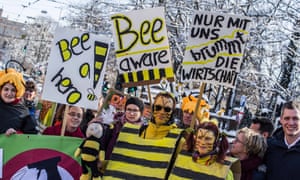Environmentalists in Germany are celebrating a decision by Bavaria to adopt a series of measures to “save the bees” that may revolutionise farming practice across the country.
“This is a milestone for nature protection and a fine hour for citizen law-making in Bavaria,” said Ludwig Hartmann, of the Green party, one of the initiators of a petition that prompted the move. “This is a reason to be joyful, but also an incentive to jointly advance further important projects for the protection of our environment and the climate.”
The petition’s adoption into law won praise from campaigners across Europe who said they aimed to copy it. The petition received support from 1.75 million Bavarians – more than a fifth of the state electorate – and was thought to be the biggest ever of its kind.
The state government had a deadline within which to enact the petition’s demands or start negotiating with its organisers to come up with mutually acceptable alternatives that could have been put to voters in a follow-up referendum. Bavaria’s premier, Markus Söder, said he would adopt the measures in full, tweaking only a few aspects as recommended by the petition’s authors.
Other German states are now planning to hold their own public votes, including Brandenburg and North Rhine Westphalia, the country’s most populous state.
The petition called for 20% of agricultural land in Bavaria to meet organic standards by 2025, and 30% by 2030, for 10% of green spaces to be turned into wildflower meadows, and for land and streams to be more stringently protected from pesticides and fertilisers. Bavaria has the most farmed land of any German state.
Söder has stressed the need to bring Bavarians together after protests from farmers, many of whom said they were being unfairly painted as indifferent to environmental concerns.
The farmers’ main criticism related to calls for a ban on ploughing green spaces from the middle of March, which was widely said to be unrealistic because parts of Bavaria often are still covered in snow at this time.
Söder’s Christian Social Union (CSU), the sister party of Angela Merkel’s CDU, has been accused by some of its supporters of being too passive in its adoption of the law.
The Greens hope to make hay in the European parliament elections in May and have been polling at about 20% for months. The EU’s agricultural policy faces reform and the Greens hope to expand their influence to promote ecological measures.
A German study published in 2017 found the abundance of flying insects had fallen by three-quarters in 25 years. A separate study published in February concluded that the world’s insects were on a path to extinction within a few decades.
Germany’s environmental ministry is taking the subject seriously, working on its own programme for insect protection, due to be completed by the summer. It will include nationwide targets to reduce light pollution as well as initiatives to increase the number of protected areas.
Fridays for Future rallies, spearheaded by the Swedish campaigner Greta Thunberg, have been particularly popular in Germany, even receiving the cautious backing of Merkel. A rally on 21 June is expected to attract record numbers.
